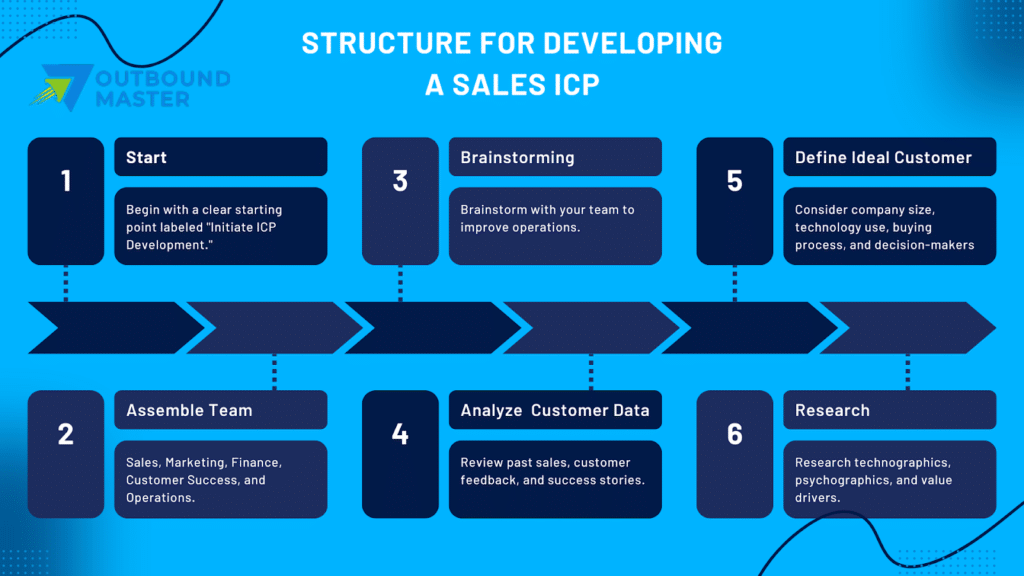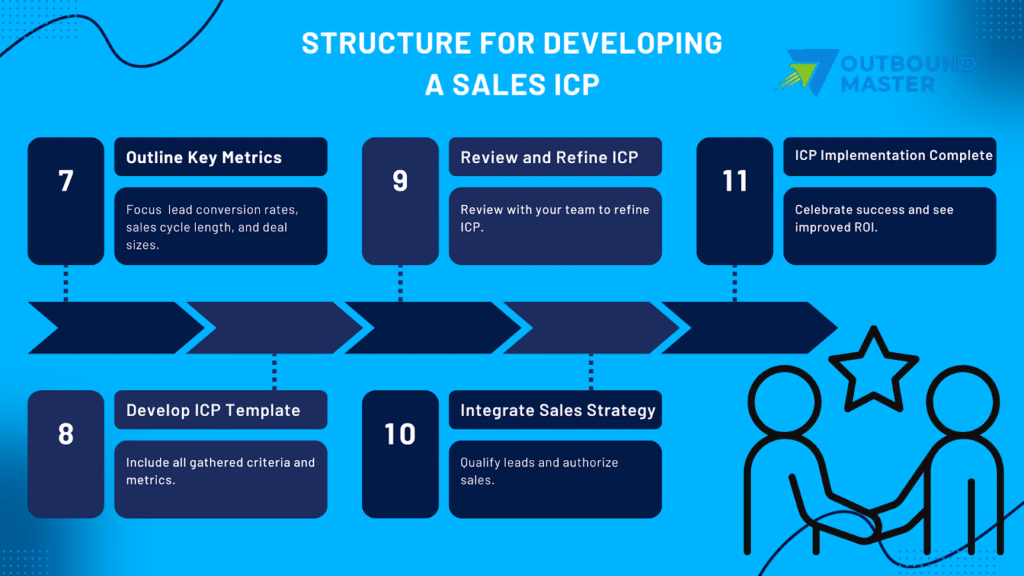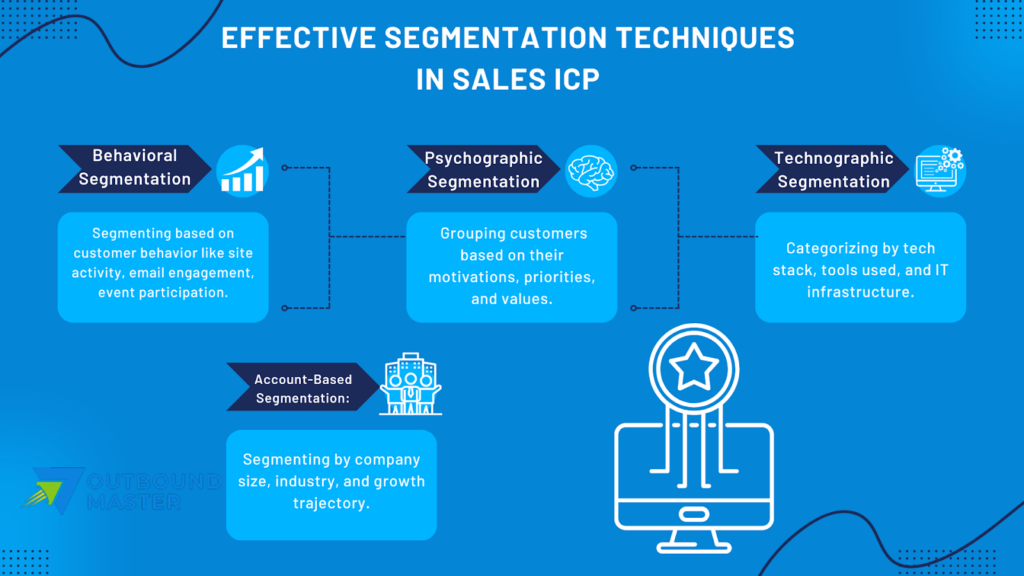ICP in Sales: All You Need to Know
Understanding your ideal customer is the foundation of an effective sales strategy. Developing an ideal customer profile (ICP) enables your sales teams to identify and target the accounts most likely to purchase your products or services. This blog post will explore what an ICP is, how to build one, and why it is so integral for sales success.
Understanding the Essence of Sales ICP
An ideal customer profile focuses specifically on the needs of your sales team. As opposed to a more general buyer persona used in marketing, an ICP helps sales reps:
- Identify the accounts that best align with your offerings
- Craft targeted messaging to resonate with priority prospects
- Qualify leads more efficiently
- Shorten the sales cycle for desired deals
With an ICP, your salespeople can deliver the precision targeting buyers want. Let’s examine how an ICP complements a buyer persona while serving the unique needs of sales.
The Intersection of Sales ICP and Buyer Persona
While an ICP and buyer persona serve related purposes, they have distinct differences:
| Aspect | Buyer Persona | Ideal Customer Profile (ICP) |
| Definition | A semi-fictional representation of your ideal customer based on market research and real data. | A detailed description of a company or account that represents the best fit for your product or service. |
| Created By | Typically developed by the Marketing team. | Usually created by the Sales team, often in collaboration with Marketing. |
| Primary Goal | To guide content creation, marketing strategies, and overall customer engagement. | To identify and prioritize potential accounts or leads for sales targeting and outreach. |
| Focus | Centers on individual decision-makers or users. | Focuses on the account or organization level. |
| Details Included | Demographic information, behavior patterns, motivations, goals, pain points. | Company size, industry, budget, technology use, purchasing authority, and likelihood to buy. |
| Usage | Used to tailor marketing messages and campaigns to resonate with different segments of the audience. | Used to streamline sales efforts towards the most promising prospects and personalize sales pitches and interactions. |
| Data Sources | Market research, surveys, customer feedback, website analytics. | Sales data, customer feedback, CRM data, market analysis. |
| Outcome | Improved marketing effectiveness, better customer engagement, enhanced brand loyalty. | Shorter sales cycles, higher conversion rates, more efficient allocation of sales resources. |
For example, marketing may have a persona for Chief Information Officers, documenting their goals, pain points, and media consumption. While useful for content creation, this doesn’t necessarily help sales predict which CIOs will actually make a purchase. This is where the ICP comes in – providing the attributes of accounts with the highest potential to convert.
Strategic Development of Sales ICP
Constructing your sales ICP takes careful examination of current customers. As the saying goes, your existing clients are a goldmine of insights. By analyzing historical deals, identifying common themes among your best customers will emerge.
The key steps include:
- Assembling cross-functional teams: Bring together sales, marketing, finance, customer success, and operations to contribute unique perspectives
- Establishing ideal customer criteria: Profile characteristics like company size, technologies used, buying process and decision-makers
- Researching beyond basic firmographics: Evaluate technographic, psychographics, and value drivers to deeply understand your best-fit customers
- Defining sales metrics and processes: Outline quantitative metrics and structured workflows to target and qualify ICP accounts
This discovery process takes time and strategic planning but pays off exponentially. Let’s explore how a refined ICP powers targeting and segmentation.
Segmentation and Targeting in Sales ICP


An exceptional ICP doesn’t only list ideal customer traits, but segments them into divisions for tiered prospecting.
Techniques for Segmentation
While ICP development examines historical deals, segmentation involves analyzing current prospects. Powerful approaches include:
- Behavioral: Segment by site activity, email engagement, event participation
- Psychographic: Group by motivations, priorities, vision or values
- Technographic: Categorize by tech stack, tools used, IT infrastructure
- Account-based: Separate by company size, industry, growth trajectory
The Power of Targeted Outreach
Armed with these segments, sales teams can execute tailored outreach driving dramatic results:
- Email open rates jump over 50% with personalized messaging
- Meeting booking rises 70% when tailored to ICP fit
- Win rates for properly qualified apps increase by over 10%
Now let’s apply this strategic ICP directly to impactful campaigns.
Implementing Sales ICP in Campaigns

An ICP serves little purpose unless actively implemented across sales and marketing initiatives:
Crafting Targeted Campaign Content
- Map ICP segments to campaign offers and messaging
- Produce customized collateral for profiled accounts
- Empower sales with content kits for closing best-fit customers
Executing and Optimizing Campaigns
- Launch broad nurturing programs informed by ICP needs
- Develop targeted campaigns for high-potential segments
- Track campaign KPIs by segment to double down on what works
This cycle of continual optimization allows you to refine Segments and offers ensuring they resonate powerfully with your ICP.
Aligning Sales and Marketing with ICP
The full impact of an ICP is realized when perfectly aligned to broader demand generation programs. By integrating ICP and personas across teams, seamless hand-off and shared metrics can be achieved.
For example, marketing may pass segmented lead lists based on their buyer persona. Sales can instantly map these to their matching ICPSegments for rapid follow-up using personalized content.
Let’s explore advanced tools providing unprecedented abilities to unify sales and marketing with the ICP.
Advanced Insights and Tools for Sales ICP
Sophisticated solutions are transforming ICP capabilities with previously impossible depth and dynamism:
LinkedIn Sales Navigator
- In-depth firmographic and technographic data
- Powerful filtering and lead list building
- Saved search alerts when ideal accounts are engaged
LaGrowthMachine
- Central workspace aligning personas and ICP
- Custom scoring models to grade fit
- Relationship mapping revealing hidden connections
Instead of static profiles, modern platforms enable living ICPs adapting in real-time to your ideal customer.
Final Takeaway
A strategic sales ICP forms the foundation for precision prospecting, shortened sales cycles, and accelerated revenue growth. While development may seem intensive, the lifetime value rapidly offsets initial efforts. By delivering true personalization at scale, an ICP enables impactful engagement throughout the customer journey.
Frequently Asked Questions (FAQs)
How does Sales ICP differ from Marketing ICP, and why is this distinction important?
While marketing focuses on general buyer persona traits, the sales ICP zones in on propensity to purchase specific offerings. This supports sales in targeting high-potential accounts and crafting messaging to overcome customer-specific barriers.
What are the key steps in developing an effective Sales ICP?
Critical steps include assembling cross-functional teams, analyzing current customer data, defining both attributes and buying behaviors, segmenting prospects based on multiple attributes, and integrating directly into campaigns and content strategies.
How can Sales ICP alignment with marketing strategies enhance overall business performance?
Shared ICPs and buyer personas between sales and marketing ensures seamless transition for prospects. Perfect hand-off and unified messaging results in extraordinary conversion rate lift.



